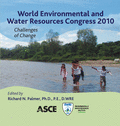A Consolidated Approach to Stream Stability Analysis
Publication: World Environmental and Water Resources Congress 2010: Challenges of Change
Abstract
For the past four years, the Town of Castle Rock has been master planning the watersheds within its jurisdiction. As a part of each master planning process, a stream stability analysis was conducted to establish a stable channel grade by reach. Each master planned channel had unique characteristics that affected the stable channel grade including vegetation, soil characteristics and flow regimes. These same characteristics also affected the selection of the stable channel calculation methodology. There are many methodologies to calculate the long-term stable channel grade of a natural channel. Incipient motion of the bed material present in the channel is the basis for most of the commonly used methods of stream stability analysis. The methods include the permissible velocity method, permissible shear stress method and sediment transport equilibrium methodology. The long-term stable channel grades within the Town of Castle Rock were calculated for each channel utilizing different methodologies depending on the fluvial geomorphology and flow regime of the channels. As might be expected, the results of the analyses have varied based on local channel conditions. Due to the various methodologies and results obtained during the long-term stream stability analysis, a technique for the calculation of long-term stable channel grades that would be consistent for all Master Plans and could be quickly employed with a minimum of data gathered from online sources and field observations needed to be developed. The selected analysis technique identified conditions related to flow rate, regime and soil types to predict stable channel grades. This allowed the identification of required stream stabilization infrastructure while managing the variability associated with the analytical technique. The identified stream stability analysis process for Castle Rock also provided some broad generalizations regarding computed stable slopes and offers some guidance for engineers and planners when budget or time do not permit a more exhaustive stream stability analysis. These broad recommendations establish a more site-specific recommendation than the prevailing 0.4% long-term stable channel slope often applied to studies along Colorado Front Range streams. The general findings based on the application of the new process include stable channel slopes that vary along the length of the reach of interest based on physical and hydraulic properties. These findings allow the optimized placement of stabilization structures and an opportunity for a phased approach to stabilization along the steep terrain unique to the area to help manage the uncertainty of assumptions inherent in the analytical technique.
Get full access to this chapter
View all available purchase options and get full access to this chapter.
Information & Authors
Information
Published In
Copyright
© 2010 American Society of Civil Engineers.
History
Published online: Apr 26, 2012
Authors
Metrics & Citations
Metrics
Citations
Download citation
If you have the appropriate software installed, you can download article citation data to the citation manager of your choice. Simply select your manager software from the list below and click Download.
